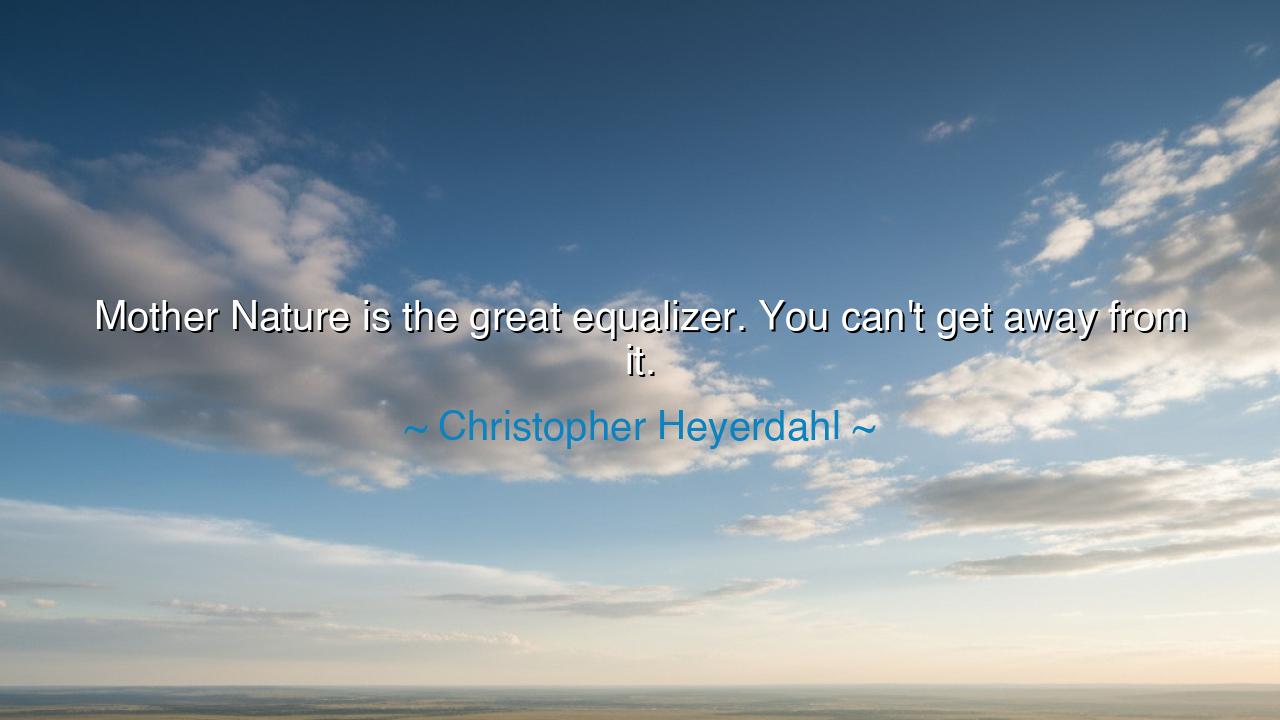
Mother Nature is the great equalizer. You can't get away from it.






“Mother Nature is the great equalizer. You can’t get away from it.” Thus spoke Christopher Heyerdahl, a man whose words echo not merely as an observation, but as a timeless reminder of the humbling truth that governs all existence. In his simple phrasing lies a profound wisdom—one that has echoed through the ages, whispered by winds over mountains and thundered by waves against the shore. For Nature, vast and impartial, recognizes no crown, no coin, no class. It levels the proud and shelters the meek alike. It is the great equalizer, the eternal power before which all beings—rich or poor, mighty or frail—must bow.
In this truth, we see the reflection of an ancient law, older than any kingdom or creed: that man, for all his artifice, remains a child of the earth. Empires may rise, and cities may blaze against the night sky, but Nature endures, unbent by human pride. The winds still howl over ruins, the rain still falls upon beggars and kings alike. Whether one sails upon a golden ship or clings to driftwood, the storm shows no favor. In this way, Heyerdahl reminds us that all of humanity shares one mother—the Earth herself—and that none may claim dominion over her laws.
The ancients spoke of this truth often. The Stoics of Greece and Rome, gazing upon the heavens, taught that the forces of Nature were divine, impartial, and beyond man’s control. Marcus Aurelius, the philosopher-emperor, wrote: “All that happens is natural; accept it as if it were what you desired.” He understood that to resist Nature is to resist one’s own being. The floods, the droughts, the changing of seasons—these are not enemies, but the voice of the cosmos reminding us of balance. Even King Canute of England, when his courtiers flattered him with false praise, set his throne upon the shore and commanded the tide to halt. When it did not, he turned to them and said, “Let all men know how empty is the power of kings.” In that moment, Canute taught the same lesson Heyerdahl now recalls: that no one can escape Nature’s rule.
In modern times, we have grown arrogant once more, believing that machines and cities shield us from the old laws. We think ourselves masters of storm and soil, architects of our destiny. Yet when the earth trembles or the winds rage, our illusions fall away. The mightiest towers crumble as swiftly as the huts beside them. The sun scorches both the powerful and the powerless, and in famine or fire, all humanity stands equal again. In those moments, stripped of our pretensions, we remember what we truly are—creatures of flesh and breath, fragile yet enduring, bound by the same rhythms that guide the tides and the stars.
But there is mercy in this humbling truth. For if Nature is the great equalizer, then she is also the great teacher. She reminds us that wealth and title do not grant worth, and that humility before her laws brings harmony. To live wisely is to live in accordance with Nature, not against it. This does not mean retreating from civilization, but remembering that all our progress must flow with the current of the earth, not against it. When we plant rather than plunder, when we listen instead of command, we find a peace deeper than any victory. The soil does not lie; it yields only what is sown in respect.
Consider the story of Pompeii, the proud Roman city that fell beneath the fury of Mount Vesuvius. Its citizens, wealthy and learned, believed their world unshakable—until the mountain spoke. In a single day, all were made equal: senators and slaves, merchants and children, preserved together in the same ash. Yet from that tragedy, generations learned a truth that endures: the earth remembers, and she teaches through her silence. Heyerdahl’s words echo this same warning and wonder—that we live at her mercy, and that in acknowledging her power, we find our rightful place in the grand order of life.
Therefore, let this be the lesson passed down to those who would listen: honor the earth that sustains you. Do not think yourself above her cycles or her seasons. Walk gently upon her soil, for every step echoes across eternity. Let humility guide your progress, let gratitude temper your ambition. When the winds rise, do not curse them; learn from their strength. When the rain falls, do not flee from it; remember that it nourishes even as it drenches. For in understanding that you cannot get away from Nature, you will cease to fight her and begin to live in harmony with her—free, balanced, and wise.
Thus, Christopher Heyerdahl’s words stand as a testament to the eternal truth that unites all living things: that Mother Nature is both our beginning and our end, our judge and our refuge. We are her children, and though we may forget her in our arrogance, she never forgets us. To live well, then, is not to conquer her, but to walk beside her—to learn from her storms, to rejoice in her calm, and to remember always that in her vast embrace, all are equal, and all are one.






AAdministratorAdministrator
Welcome, honored guests. Please leave a comment, we will respond soon